|
Mystery Train might be my favorite place to go record shopping. The trip to Gloucester is long enough (about 45 minutes from Somerville) that I can’t justify going very often, but every time I come back with a pile of great music I certainly wouldn’t find in Boston. The just-in bins are overflowing, the records are reasonably priced, and virtually every genre has great finds. Someday I’ll head up to Mystery Train with a Record Store Day budget and stock up on jazz, Cocteau Twins EPs, and contemporary composers, but for now I’ll make the trip every few months—it had been at least six since my last trip—spend a few hours there, and go through a painful process of elimination.
The key to Mystery Train is exploring all of the additional, unpriced stock under the bins and off to the side (and going on a day when the owner’s available to price them for you). Here’s the simple logic: certain things that were overwhelmingly stocked in 1988 are now much harder to track down. I remember one particular trip when I “hid” a number of understock finds (The Smiths’ The Queen Is Dead, Morrissey’s Viva Hate, Ghostface Killah’s Supreme Clientele, American Music Club’s California among others) because no one was able to price them for me, and thankfully my cache was still in its hiding place during my next visit. This trip’s understock find was The Moon and the Melodies, but I didn’t have as much time to explore as usual.
68. The Smiths – Hatful of Hollow – Rough Trade, 1984 – $12.50
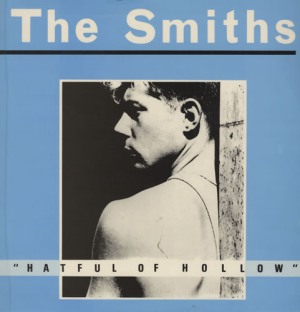
Virtually every record store has a plastic divider for the Smiths, but it’s becoming increasingly rare when anything actually occupies the slot. Judging by the reasonable prices on eBay, it’s not because the primary Smiths LPs are particularly scarce. There are plenty of singles, limited pressings, hard-to-find EPs, live bootlegs, and import editions to hunt down, but if you’re just interested in The Smiths, Meat Is Murder, The Queen Is Dead, Strangeways Here We Come, and Hatful of Hollow, you should be able to get them for around $10 apiece or cheaper if you can find a combination lot. Good luck finding any of those in a metropolitan store, however, unless there’s a pricey reissue in stock. The reason for this absence is that the Smiths are the vanguard artist for the 1980s division of the vinyl revival, much like Neutral Milk Hotel’s In the Aeroplane Over the Sea is the standard-bearer for 1990s indie vinyl nostalgia. Striking artwork, an ever-expanding cult audience, a comparatively limited catalog free of extended club mixes (cough, The Cure)—all of these help create an immediate, broad demand for the titles. “Oh, there’s a copy of The Smiths! Grab it!” The difference, of course, is that Aeroplane is still in print, which let it hit #6 on the top vinyl sellers for 2008. (Somehow, In Your Ear in Cambridge still has the gall to charge $25 for a used copy!) I’d previously mentioned the limited edition run of reissue Smiths singles, but they’d be wise to do entry-level priced copies of those major LPs and cash in huge. Forget these $18 picture discs and $27 colored vinyl editions; do $12 single LP pressings in 120 gram vinyl, and then switch to indulgent, 3LP collector’s editions a year later. (Edit: I see that Vinyl Collective is taking pre-orders for reissues of the Smiths' four full-lengths, with 2008 remasters courtesy of Johnny Marr, but at $24.49 they're twice what I'd recommend charging.)
It’s not like the Smiths are above cashing in. Hatful of Hollow was the first in a series of compilation releases to combine singles, b-sides, and alternate takes of their songs, catering to their fans’ desire for the original BBC Radio 1 recordings of early songs. I personally started out with the Smiths’ studio releases, but like Floodwatchmusic has discussed, such compilation releases may paint a more accurate picture of the group’s successes. I’m up in the air about my preferences, but the recordings of “Hand in Glove” and “What Difference Does It Make?” are more immediate here than on their self-titled LP and in total, six versions (and one completely exclusive song) aren’t available elsewhere. That’s not nearly as bad as the “Here’s our greatest hits compilation with one completely new song!” trick that so many bands pull. I’m not enough of a Smiths devotee for such a ruse to work on me, but if I come across Louder Than Bombs or Rank, you can guess what’s going to happen. I just know that it’s far more likely to happen in Lowell, Salem, or Gloucester than in Boston proper.
69. Brian Eno with Daniel Lanois and Roger Eno – Apollo: Atmospheres and Soundtracks –E.G., 1983 – $6.50

I recently attended a special performance of the Boston Pops for MIT’s Giant Leaps, a symposium on the 40th anniversary of the Apollo moon landing. The performance of four-sevenths of Gustav Holst’s “The Planets” featured narration from Buzz Aldrin and a series of short films for the respective planets. (Only Mars, Venus, Jupiter, and Uranus were performed.) Aside from a brief introduction relating his experience journeying to the moon, Aldrin’s narration was penned by a college professor, with the flowery language fitting the occasion but not the speaker. As a culmination of the symposium, the event made sense, especially the post-intermission set list of sci-fi theme music (Close Encounters of the Third Kind, Star Trek, Star Wars), but even with one of the first men to step foot on the moon helming the show, it felt strangely routine.
There are, of course, different ways to honor and represent the event, and my musical proclivities align more closely with Brian Eno’s 1983 Apollo: Atmospheres and Soundtracks LP. I debated whether to buy it, already owning four of Eno’s ambient LPs, but Apollo’s specific focus makes for a truly inspired listen, perhaps even more so than Eno’s ambient series. Originally recorded for use in Al Reinart’s For All Mankind documentary (eventually released in 1989, now available from the Criterion Collection), Apollo hardly requires a visual accompaniment to evoke mental images of space travel. Eno’s liner notes explain how “the television coverage left me unsatisfied… the fear of boring the public had led the editors and commentators to present the transmissions from space in an up tempo, ‘newsy’ manner that was unsympathetic.” Ultimately this “[obscured] the grandeur and strangeness of the event.” In line with that thinking, these twelve songs drift between wonder, somber perspective, eerie chills, and the overwhelming quiet that Aldrin mentioned during his introduction. The centerpiece is “An Ending (Ascent),” a calm suite of echoing beauty. I’m interested in seeing For All Mankind, but Apollo: Atmospheres and Soundtracks is a marvelous piece on its own accord.
70. New Order – Ceremony LP – Factory, 1981 – $6.50
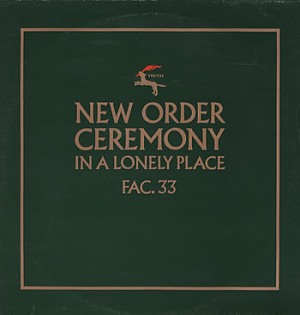
I always check the Joy Division and New Order slots in record stores, even though they’re usually filled with copies of the latter’s mid to late ’80s singles. (Yawn.) Finding the 12” for “Ceremony”—the original pressing, as it turns out—was a treat, like when I’d picked up the original Factory issue of Joy Division’s Closer from Record Exchange for eight bucks. The version of the single even matters, surprisingly enough, beyond its higher value. The first pressing of “Ceremony” features different performances than the second pressing or Substance, since Gillian Gilbert is present on the re-recordings (among other changes specified in the Wikipedia entry). It’s essentially a difference between sounding more like Closer on the original pressing and sounding slightly more like New Order’s Movement on the second. Not a huge difference, it’s an interesting evolution from Joy Division without Ian Curtis to New Order as its own entity, key since Ian Curtis penned both songs.
“Ceremony” is floating around in a few frustrating, if tantalizing forms with Curtis on vocals, including a live version from Joy Division’s final concert on Still and a salvaged rehearsal recording on the 4CD Heart and Soul box set. Blasphemy, perhaps, to prefer the New Order version over these rough Joy Division sketches, but having Curtis write his own eulogy is too perfect, too affecting to ignore.
71. Cocteau Twins and Harold Budd – The Moon and the Melodies LP – 4AD, 1986 – $6.50
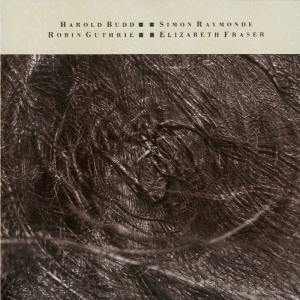
I’d initially pulled a copy of Harold Budd’s Lovely Thunder from the just-in stacks, recalling his collaboration with Brian Eno on Ambient 2: The Plateaux of Mirror, perhaps my favorite of Eno’s ambient series. I’d checked Amazon reviews to confirm that it was worth hearing and found out that “Flowered Knife Shadows” had appeared in a slightly different form as “Memory Gongs” on Budd’s collaboration with the members of the Cocteau Twins, The Moon and the Melodies. I thought, “Wouldn’t it be nice to find that album?” as I milled about the unpriced stock around the edges of the store, only to find a copy of The Moon and the Melodies just before leaving. Sorry Lovely Thunder, you’ll have to wait for another visit.
I credited Cocteau Twins for this album instead of the members’ names out of sheer laziness, but their biography mentions that they went to great lengths not to credit their band name, since they didn’t want The Moon and the Melodies to be misconstrued as a proper Cocteau Twins album. Yet the Cocteaus were dead-on when they mentioned in a 1989 Sound on Sound interview that “it turned out more like four songs that sounded like us and four songs that sounded like him.” For those keeping track, “Sea, Swallow Me,” “Eyes Are Mosaics,” “She Will Destroy You,” and “Ooze Out and Away, Onehow” sound like Cocteau Twins, “Memory Gongs,” “Why Do You Love Me,” “The Ghost Has No Home,” and “Bloody and Blunt” sound like Harold Budd. “Bloody and Blunt” and “Ooze Out and Away, Onehow” do the best job of merging their respective strengths, but with Liz Fraser only singing on the four “Cocteau Twins” songs, there’s only so much bridging that can occur. I’m not deriding this stylistic split, since drifting between the approaches adds to the half-asleep atmosphere, but Budd’s collaboration with Eno seems like a more natural combination of aesthetics.
|
|
I’d visited Everyday Music during my last trip to Seattle, although it’s moved locations since that visit. Last time I got Chavez’s Ride the Fader LP, Hot Snakes’ Audit in Progress LP, and at least one more album if memory serves. This time around I found my two LP purchases (and the vast majority of things I considered purchasing but passed on buying ) in the just-in bin, which was organized by day (!). The general rock LP stock felt somewhat picked-over, perhaps because of the prime location by the Jimi Hendrix statue, but the seven-inches had some fine stragglers from the glory days of 1990s indie rock.
34. Cocteau Twins – Lullabies LP – 4AD, 1982 – $6
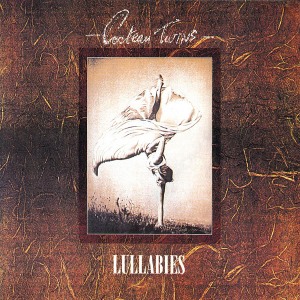
After seeing an LP copy of Blue Bell Knoll for $20 at Sonic Boom, I was a bit concerned that any Cocteau Twins material I’d find in town would be grossly overpriced, but six bucks for this EP seems entirely reasonable. I couldn’t remember if the songs on Lullabies were included on The Pink Opaque, their early singles compilation, but I checked their Wikipedia and found out that they’re not. I’ve passed on a few of the EPs because of that reason—as much as I love “The Spangle Maker,” I don’t need it on multiple LPs—but I I’m glad to have more of their early work. I still need to track down Garlands, which I found at Looney Tunes in Cambridge, but it turned out to be sleeve-only, since the LP inside was a different Cocteau Twins release. Maybe I’ll even find a copy of Heaven or Las Vegas one of these days.
As for Lullabies, it’s more aggressive than I anticipated, perhaps because of original bassist Will Heggie. “Feathered Oar Blades” is downright driving, with a nearly cacophonous drum conclusion, “Alas Dies Laughing” is woozy concoction of edgy guitar leads and Liz Fraser’s repetitive phrases, and “All but an Ark Lark” pushes forward for eight minutes before finishing off with Fraser’s whoops and Robin Guthrie’s guitar feedback.
35. Modest Mouse / 764-Hero – Whenever You See Fit LP – Up / Suicide Squeeze, 1998 – $8
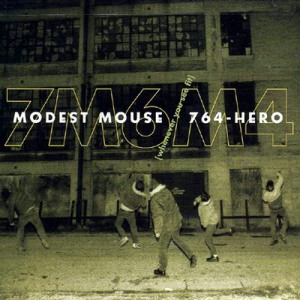
Modest Mouse vinyl goes for gross amounts on eBay, especially the double LP, double sleeve edition of Lonesome Crowded West (I recently saw an auction for just one of these LPs), but I’m not sure of the value of this release, especially since the store had two copies of it for eight bucks apiece. I grabbed Everywhere and His Nasty Parlour Tricks from Mystery Train last summer with the intent of selling it, but it’s becoming quite apparent that I’m not particularly apt at the money-making aspects of collecting records, unless I have absolutely no interest in the group.
That isn’t the case here, since I am fond of early Modest Mouse. I don’t, however, recall having heard this collaborative release between them and the forgettable 764-Hero. I saw 764-Hero and a pre-Oh Inverted World version of The Shins open) for Modest Mouse at the Highdive in Champaign and heard at least one of their records, but my only impression of the group was generic Northwestern indie rock, like some extrapolation of Built to Spill and Modest Mouse’s aesthetic without the charisma. Maybe time has been kinder to 764-Hero than I imagine, but I have a feeling this will be the only release of theirs I pick up. Having now listened to the song (not the two remixes, I’ll save those for a rainy day), it’s an endearingly shambling combination of both bands, with Isaac Brock’s vocals and guitar trumping most other elements in the song. I am disappointed that these two groups could only string “Whenever You See Fit” along for fourteen and a half minutes.
36. Shiner – “Sleep It Off” b/w “Half Empty” 7” – Sub Pop, 1997 – $1
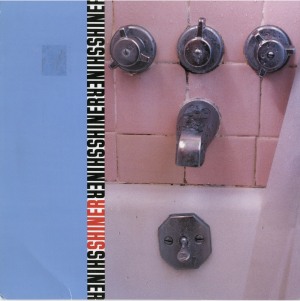
For a group that only pressed one of their full-lengths (their debut Splay) on vinyl, Shiner managed to put out a number of great singles, especially their Sub Pop single for “Sleep It Off” and “Half Empty.” The former made the re-release of Lula Divinia along with “Two Black Eyes” (which was originally included on a Law of Inertia compilation that also featured an early version of Durian’s “Four Mile Drop”), but “Half Empty” is just as good. “Brooks” b/w “Released” isn’t as essential, since both songs were on Splay, but “Cowboy” b/w “Floodwater” is worth hearing if you enjoy Splay-era Shiner. The split singles with Molly McGuire (“Crush”) and The Farewell Bend (“Spinning”) aren’t essential, but the former is exclusive and the latter is a slightly different version from the one on Starless. Ditto for “Semper Fi,” the best song from that album, but “A Sailor’s Fate” is a woozy, somewhat Louisville-influenced take on that era of Shiner’s sound. I tend to think of Shiner foremost as a live band, then an album band, but there’s good material on these singles and it’s a shame that some of them can be hard to track down.
A potential Shiner singles and rarities compilation could also include “Dirty Jazz” and “I’ll Leave Without You” from the Japanese pressing of The Egg, their cover of “Only Shallow” from the Grand Theft Autumn compilation, and a few unreleased tracks. It would provide fitting closure for Shiner, especially if they paired it with a DVD of their final performance in Kansas City. Considering that the group is working on a DVD release at the moment, this suggestion doesn’t seem to be unrealistic.
It shouldn’t be any surprise that I already owned this single, having ordered it from Parasol when it came out, but buying a second copy of a buck seemed like a no-brainer. I passed on a second copy of the Molly McGuire split single since I’m not exactly wearing out Shiner’s “Crush.”
37. Vitreous Humor – “My Midget” b/w “New Victoria Theater” 7” – Mute, 1996 – $2
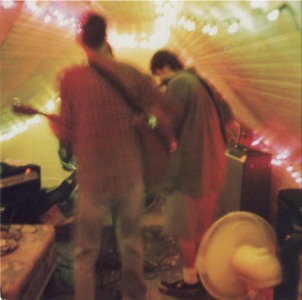
I have Vitreous Humor’s first single, but I can’t remember much about it beyond a vague recollection of that Crank!-style of Midwestern indie/emo. I had no idea that they’d signed to a major until I saw this single, but apparently their time on Mute was limited to this slice of wax. Neither of these songs sounds remotely like a cash-grab and “My Midget” even begins with some lengthy instrumental interplay. Time to check out their self-titled EP and aptly titled Posthumous CD.
After Vitreous Humor broke up, three of the members reconvened in the short-lived The Regrets, whose lone CD, New Directions: Result Beat Boasts, was pulled out of the Reckless dollar bin a few years ago. I have even less recollection of that CD except that it was somewhat poppier than the Vitreous Humor single. A year after the Regrets split, one-hit wonders Nada Surf covered Vitreous Humor’s “Why Are You So Mean to Me?” at the behest of their label, which even slotted it as the lead single for their second album. Please cover this obscure indie rock band’s song. We know it’ll be a hit. It sounds like they hired me as an A&R guy.
38. Wider – “Main” b/w “Strapping ½” 7” – Third Gear, 1995 – $0.50

I’d seen Wider cross-referenced a number of times in relation to Chavez, since James Lo played drums and Matt Sweeney played bass in this group prior to joining Chavez (although the latter doesn’t appear on this single). I’d never actually heard Wider, though, and it’s entirely possible that I’d never seen one of their singles before, either. There’s another 7” floating around for “Triangle” b/w “Bloom,” which seems to come up exclusively through eBay searches. Is there a full-length floating around as well? Wider isn’t the most Google-friendly band name.
The music, to my expectations, is typical early-to-mid 1990s aggressive math-rock, with vocals only on the A side. Buying this single right after Don Caballero’s For Respect makes a lot of sense to me.
|
|
If I learned anything from my most recent list-making exercise, it’s that my knowledge of 1980s music lacks depth, despite my attempts to expand beyond staples like R.E.M., The Smiths, Pixies, and U2. I spent the decade playing with Legos, not buying indie LPs, so I’ll excuse my deficiencies. Muxtape #2: “Making the Body Search” is comprised entirely of songs from that decade, a few of which I’ve only recently stumbled upon. I’m keeping artists to one appearance on this Muxtape series, so no Colin Newman or Wipers, although Newman’s “Ahead” from Wire’s The Ideal Copy provides the subtitle.
1. Cocteau Twins – “The Spangle Maker”: Considering that I can rarely make it through a whole Cocteau Twins album in one sitting, I’ve been listening to them an awful lot lately. Every release seems to have a handful of gems that plead with me to keep listening, keep checking out more Cocteau Twins LPs, and I have complied.
2. For Against – “Shine”: If you had asked me to guess where For Against originated, I would have answered, “Some industrial town in England.” I would not have guessed Lincoln, Nebraska.
3. The Feelies: “Slipping into Something”: This song is the highlight of their 1986 album The Good Earth, which I covered in Record Recollection Reconciliation. It starts off slowly enough, but when the guitars pick up it nearly runs off the rails.
4. Mekons – “Empire of the Senseless”: I never knew what to make of the Mekons when reading through Touch & Go / Quarterstick catalogs back in high school so I stayed away from their expanding hoard of releases. But after including the enticing Fear and Whiskey in the last round of iPod Chicanery, I gave The Mekons Rock ‘n’ Roll a listen and was even more impressed. Tracking down their multitude of LPs could keep me busy for a while.
5. Elvis Costello and the Attractions – “New Lace Sleeves”: I purchased Trust on LP back in high school when Mark / Western Homes heralded its greatness, but I’ve kept to edgier efforts like My Aim Is True, This Year’s Model, and Blood & Chocolate in spite of Trust’s lingering presence in my collection. The soul-inflected “New Lace Sleeves” caught my attention, however, so I’ll have to pull out that dusty LP soon.
6. Brian Eno & Harold Budd – “Not Yet Remembered”: From their acclaimed collaboration, Ambient II: Soporific Boogaloo.
7. Killing Joke – “Unspeakable”: Most fans prefer their 1980 self-titled debut, but What’s THIS For...! took their tribal drums, razor-wire guitar, and bellowed vocals to stranger, more apocalyptic places.
8. Comsat Angels – “Eye of the Lens”: Sleep No More is a great slab of post-punk, but it’s even better appended with post-album singles “Eye of the Lens” and “(Do the) Empty House.”
9. The Dead Milkmen – “Big Lizard”: I can only assume that my selection of Big Lizard in My Backyard for 1985 was the most curious choice on my recent list (“better” records from Hüsker Dü, The Meat Puppets, Mekons, The Pogues, The Replacements, and Tom Waits simply don’t have the necessary playtime for me to choose them), but I have nothing but fond memories of dubbing Dead Milkmen cassettes with friends in middle school. Even with a line like “And you should see the way it shits,” “Big Lizard” isn’t as juvenile as the rest of the album. It comes rather to melancholy for a song about the military blowing up a kid’s pet lizard.
10. Minutemen – “West Germany”: I owe my breakthrough on this record to Michael T. Fournier’s book on Double Nickels on the Dime in the 33 1/3 series. Go buy it!
11. Ultramagnetic MC’s – “Kool Keith Housing Things”: I almost forgot to include any ’80s hip-hop, but Kool Keith’s original group makes the cut. He stresses the second-to-last beat of most lines on Critical Beatdown, but he certainly kicked the habit by his mid-1990s records as Dr. Octagon, Dr. Dooom, and Black Elvis.
12. Hüsker Dü – “You Can Live at Home”: The final song on their final record is a Grant Hart mega-jam.
|
21. Bruce Springsteen - Born to Run - CBS, 1975
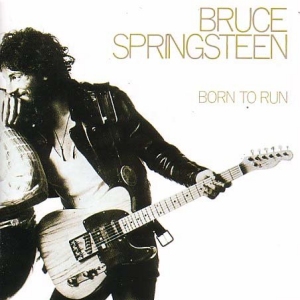
Why I Bought It: Whenever I flip through dollar bins, there are almost always records like Born to Run that pop up: critically acclaimed, audience-beloved staples of American culture and classic rock radio. While I’ve never sat down and listened to Born to Run—or any other non-Nebraska Springsteen LP—it’s essentially already part of my musical fabric, so I don’t feel the need to include it in my collection. I usually flip by such records, noting their existence but preferring to grab something less familiar, but occasionally I’ll cave to whatever populist impulses exist deep within my being and pick up one of them.
Verdict: Only three songs were instantly recognizable—“Thunder Road,”
Tenth Avenue Freeze-Out,” and “Born to Run”—but the remaining five are so endowed with the Boss’s signature sound that they could have all been massive radio hits. Each song is essentially a journey between known points, whether it’s the building fire (“Thunder Road”), the heart-tugging climax (“Born to Run”), the quiet eye of the storm (“She’s the One”), or the saxophone-enabled glory of introducing caution to the wind (“Jungleland”). It’s easy to forget that at one time these various points weren’t immediately familiar, that their effect was not a cycle of remembrance but of connection.
Unlike a number of LPs I’ve listened to in the last week, I never strained to appreciate when Springsteen and his band were doing, never questioned whether a given song fit within the whole, never wondered what other people saw in the album. Born to Run is a great record, but I already knew that. But just like I approached it, I don’t feel the sudden need to hear it or Springsteen’s other classic albums again in the near future. I’m certain I’ll listen to them at some point, maybe even building a fondness for Springsteen’s small-town-goes-big storytelling down the line, but right now I’m more concerned with records that may not be certified classics.
22. Depeche Mode - Black Celebration - Sire, 1986
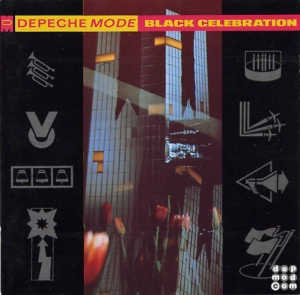
Why I Bought It: “Enjoy the Silence” and “Policy of Truth” may be on Violator (which I pulled, sans-case, from the free bin at Rhino Records in high school), but they’re good enough to merit grabbing a cheap copy of Black Celebration.
Black Celebration, particularly side A, is weighed down by a number of less-than-impressive tracks. When Dave Gahan croons over melodic synth lines on “Black Celebration,” “A Question of Time,” and “Stripped,” it’s hard to argue with the band’s formula. The same cannot be said about “Sometimes” or “A Question of Lust,” which cut back on the synthesizers and end up sounding more like a lecherous version of 1950s pop. Thanks, but no thanks. The stripped-down production of those songs also takes away from the power struggle between the dour nihilism of their gothic tendencies (“Black Celebration” starts “Let’s have a black celebration / Black celebration / Tonight / To celebrate the fact / That we’ve seen the back / Of another black day”; sigh) and their leering sexual proclivities, embodied so well in Gahan’s rich voice. While I like parts of Black Celebration enough to check out their other non-Violator albums if I see cheap copies, I get the feeling that Depeche Mode will always be a singles/highlights band to me.
23. Hz Roundtable - Birdbath EP - Intonated, 1997
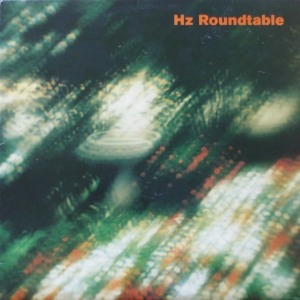
Why I Bought It: Either the Parasol catalog or the Reckless database informed me that Hz Roundtable had a connection to Midwestern indie rockers Zoom, so I snapped it up. Zoom/Hz Roundtable singer/guitarist Mark Henning is now in The National Trust, whose soul/funk hybrid reminds far more of Prince than, say, Panel Donor, but I’m willing to bet that Hz Roundtable is closer in spirit to his earlier work.
Verdict: …and I would theoretically collect on that bet. Hz Roundtable’s quirky indie rock seems like a logical offshoot of Zoom, albeit stripped of that band’s urgency and heft. With ten contributors across the six songs, Hz Roundtable is more of a collective than a highly structured band. The resulting combination of relaxed songwriting and stray instrumentation rarely helps Birdbath, however, since the songs have a tendency to drift without strong hooks to buoy them. Henning sings on the even tracks, but his voice lacks the gravity present on Zoom’s Helium Octipede. Similarly, Zoom’s distinctive guitar leads—“Balboa’s Cannon” was a mix tape staple for years—only come up on the closing track, “The Jersey Lily,” which features just Henning and Liz Bustamante. I’m disappointed that this EP doesn’t compare to Zoom’s self-titled debut or Helium Octipede, but at this point I’ve largely given up blind-buying questionable offshoots like this one.
24. Kraftwerk - Autobahn - Vertigo, 1974
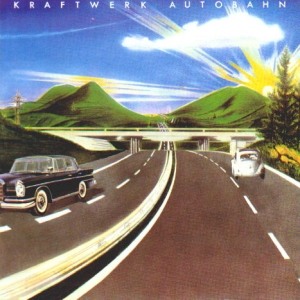
Why I Bought It: I downloaded Trans-Europe Express for an earlier iteration of iPod Chicanery and, as typically happens, I wasn’t able to find a cheap copy of that record but instead two of their earlier albums, Autobahn and Radio-Activity, and one post-Express album, The Man-Machine. I blame my late-comer status on Kraftwerk/Neu!/Tangerine Dream on the fact that my high school German textbooks only used Falco and Die Toten Hosen as examples of the country’s music. I wonder if American-penned German textbooks herald Richard Marx and Bryan Adams as the primary delegates of our cultural output.
Verdict: While this listening experience—sitting in my living room and flipping between Stuck on You and The Hunt for Red October on mute—doesn’t quite compare to hearing “Europe Endless” for the first time on an Italian train last summer, Autobahn certainly expands my idea of Kraftwerk’s range. Whereas Trans-Europe Express is defined by its cold, machine-like precision, Autobahn, like its cheery cover, is far less stoic, branching out in several unexpected directions. The title track blends the gleeful (well, as gleeful as German electronic pioneers are going to get) refrain of “Wir fahr’n fahr’n fahr’n auf der Autobahn” with a shifting melodic and rhythmic backing for a 23-minute voyage. “Kometenmelodie 1” and “Mitternacht” pull away from the sunny demeanor of “Autobahn” for some atmospheric wanderings closer to Tangerine Dream’s quiet moments. “Kometenmelodie 2” counters this drama with brighter, more insistent melodies and “Morgenspaziergang” closes the album on a particularly whimsical note. Whereas I appreciate Trans-Europe Express for its singular focus (and appropriateness for the robo-boogie), the range of Autobahn is equally appealing.
25. Cocteau Twins - Tiny Dynamite / Echoes in a Shallow Bay - 4AD, 1985
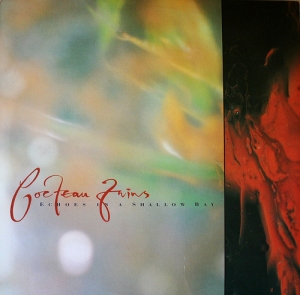
Why I Bought It: When I first listened to My Bloody Valentine’s Loveless after buying it blind around the age of seventeen, I thought, “This is the most rocking new age music I’ve ever heard!” Considering my record collection at the time consisted of indie rock, alternative rock, and the pop end of industrial, the glistening shoegaze of Loveless seemed overwhelmingly alien. I gradually checked out My Bloody Valentine’s contemporaries (Ride and Slowdive) and followers (M83, early Lassie Foundation, Ulrich Schnauss), but it wasn’t until the second round of iPod Chicanery that I finally heard one of MBV’s biggest influences. Perhaps some of the delay could due to my overall reticence in delving into 1980s indie, a reticence based largely on the presumably dated sonics and the era’s reliance on drum machines, but I have to wonder if the new age comment lingered in my memory banks. The direct lineage of Elizabeth Fraser’s glossolalic yodels to My Bloody Valentine’s blurred syllables almost prescribed a similar reaction the first time I heard Cocteau Twins. “I didn’t know Enya was in a proto-shoegaze dream pop band!”
All of this set-up takes away from my actual feelings on Cocteau Twins, based upon Treasure and Heaven or Las Vegas. Some songs (“Lorelei,” “Heaven or Las Vegas,” “I Wear Your Ring”) congeal the gossamer arrangements and Fraser’s cooing, nearly wordless* vocals with astonishing effect. Yet I rarely listen to more than five Cocteau Twins songs in a row before losing attention and moving on to something else. While I would have preferred finding either Treasure or Heaven or Las Vegas on vinyl, I’m admittedly excited about hearing their other work.
* It’s hard to explain how much amusement I get out of reading Cocteau Twins’ lyrics on SongMeanings and trying to match up the words with Fraser’s voice.
Verdict: According to Wikipedia, these two EPs were originally recorded together to test a new studio arrangement, not for popular consumption. The band decided that the material was good enough for release, so they dropped Tiny Dynamite and Echoes in a Shallow Bay just two weeks apart in November of 1984. Naturally, I get them paired together, so I essentially hear Tiny Dynamite and Echoes in a Shallow Bay as a single-album follow-up to Treasure, precisely what they wanted to avoid. Sorry, Cocteau Twins.
I can understand the band’s hesitance over designating this material as a full-length; while most of the songs are fine enough, few, if any, reach the heights of the finest material on Treasure. “Pink Orange Red” and “Pale Clouded White” are the most memorable tracks, pulling away from the drama of Treasure for a more relaxed style. The instrumental “Ribbed and Veined” seems particularly influential with regard to Slowdive, but going without Fraser’s vocals prevents me from remembering a note of the music. I’ll give the band credit for knowing exactly where this material stands: it’s certainly good enough for background or mood music, but it’s not making any statements about the band’s development. An interesting note: all of the song titles (and lyrics?) deal with Lepidoptera (the order of butterflies and moths), so if Vladimir Nabokov had still been alive in 1984, he probably would have appreciated the nod to his favorite hobby.
|
|

